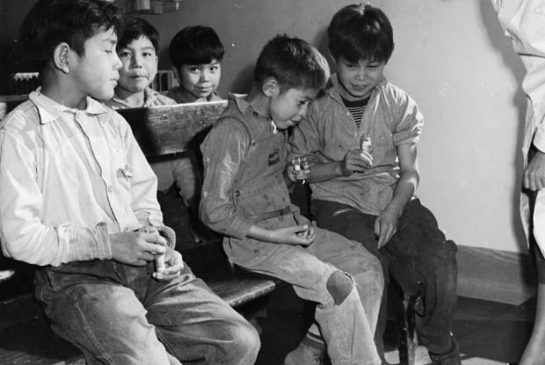Nutrition Experiments with Native Kids in 1940s Fuels Outrage
By Andrew Livingstone
The letter was written in perfect cursive. “Thank them for what they have done to us all.” Before it was mailed, two words were changed, and one added. “Thank them for what they have done for us.” Sent to government researchers and bureaucrats in Ottawa at the behest of their teachers, dozens of thank-you letters speak volumes of what little 1,300 aboriginal children knew of the experiments they were subjected to without their consent during their time at residential schools. Guinea pigs in the name of science. New historical research on nutrition experiments on aboriginal children across Canada in the 1940s and ’50s sparked outrage from aboriginal leaders Wednesday wanting a response from Ottawa. Grand Chief Shawn Atleo said says the story is dominating conversations at an assembly meeting in Whitehorse. The assembly is drafting an emergency resolution demanding that Ottawa acknowledge that aboriginal children are still hungry. While leaders decry another black mark in the nation’s history of mistreatment of aboriginals, experts say the experiments are rooted in a government’s desire to replace the traditional way of life for a modern one. Such behaviour fits the paternalistic attitude of Canada’s administration of aboriginals during the postwar period, said Mary-Ellen Kelm, an expert in aboriginal history at Simon Fraser University. “The state is the parent consenting to the researcher,” she said. “At the time, the dominate discourse is indigenous people are unhealthy because of a racial taint.” It’s important to look at the experiments in the context of the time, said Jim Miller, a professor of history at the University of Saskatchewan. The medical community did not have a well-developed understanding or procedure for securing informed consent prior to treatment or tests, he said. Details of the experiments in nutrition came from recently published historical research by Ian Mosby, a post-doctorate at the University of Guelph. However, Justice Murray Sinclair, chair of the Truth and Reconciliation Commission, said, “Everybody who was involved in scientific work (at the time) knew it was wrong to put people into an experimental situation without informing them what they were doing.” In the 1940s, malnourishment across the aboriginal population was rampant. The Canadian government knew it was their fault and recognized the “Indian problem” — aboriginals’ dependant on the system for support — was a result of cultures colliding. So, children in residential schools across the country had their milk rations halved for years, essential vitamins were kept from people who needed them, and dental services were withheld because gum health was a measuring tool for scientists and any care would distort research. This was done, Kelm believes, to protect Canada’s emerging reputation on the international stage for being a modern, humanitarian nation. “If we can come up with a one-size fits all solution, then all of these problems, including the Indian problem, will go away,” she said. “It’s a direct result of Canada developing this international reputation . . . and having this pesky group of indigenous people who won’t get better. “They’re embarrassed.” It’s paternalism with a technocratic gloss, said Maureen Lux, an expert in medicine and aboriginal people at Brock University. It’s the notion that aboriginal people need to be reformed and be no longer ‘Christianized,’ like religious missionaries had been doing for decades, but made modern. “Generally the notion was that these are people who were careless in their health and they didn’t know how to be healthy and they needed guidance from experts,” Lux said. Children taken from their homes and removed from the authority of their parents are perhaps the most vulnerable, said Brenda Macdougall, co-ordinator of the Aboriginal Studies program at the University of Ottawa. “Nobody is looking after their personal best interest,” she said.
|
.
Any original material on these pages is copyright © BishopAccountability.org 2004. Reproduce freely with attribution.
